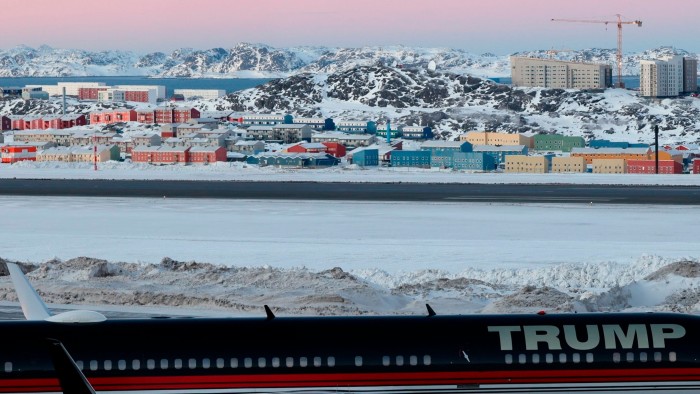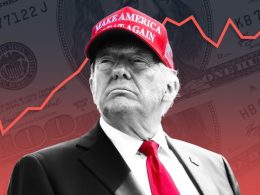Welcome to Trade Secrets. It’s just a week to go until Donald Trump’s inauguration but it feels like he’s been in office about a decade already. It remains anyone’s guess what he will actually do on any front. Maybe it’s all a bluff. Maybe Canada, Mexico and Greenland were just feints and actually he’ll invade France. Nobody knows anything.
Today I’m going to expand on what I wrote about last week — Trump’s ability to use tools of economic and trade coercion to get his way. Charted Waters is on hydrogen cars. Last week I asked you about a long-term prediction — where tariffs will be at the end of the year — for which I’m still taking entries. Today a simple one: what will be the first trade or economy-related action Trump does next week? Answers to alan.beattie@ft.com.
Get in touch. Email me at alan.beattie@ft.com
The fallout from the Greenland gambit
In last week’s Trade Secrets column I argued that Trump’s toolbox of economic security measures (tariffs, dollar payments, export restrictions on technology) was weaker than it looked and would only degrade further under him, especially if he clumsily overused them. I got some pushback from readers pointing out that he was threatening to annex an actual foreign territory (Greenland, an autonomous territory of Denmark) and waving tariffs around as part of the coercive effort, and that seemed pretty important.
True enough, so let me expand. Trump’s foreign policy is such a mishmash of trade, regulatory, immigration, military and financial policy that it’s hard to disentangle them. He regards tariffs in particular as an all-purpose cudgel to get whatever goal he wants, economic or otherwise. The list even before the Greenland gambit included fewer immigrants, less fentanyl from Canada and Mexico, and the killing of a non-existent threat of a Brics currency.
All I would say is that taken on their own, those economic tools are unlikely to be strong enough to achieve anything of real substance to the US. Or if they are, they will invite evasion or retaliation, and in any case the prize is probably not worth it. Take Greenland. What, economically, does the US want from Greenland? Critical minerals? There are a lot of critical minerals there, but they’re pretty remote and mining them is going to create all sorts of opposition.
In any case, the issue with minerals is not usually their simply not existing in nature. It’s the cost of extraction and particularly of refining. Is this going to be worth a trade war with the EU? If Trump really wants to launch a trade war and target Denmark by using tariffs on goods that originate in the country, he’s going to be blocking Ozempic, which might have the odd repercussion back home. To get Denmark to give in is likely to require something more drastic from outside the economic arsenal, like an actual threat to invade.
The point is that there is no guarantee Trump won’t do mad stuff, but it’s probably stuff that will hurt the US more in the long run. As I’ve argued before, Trump’s main threat to global trade is actually to remove the US security that underpins it — not just (or perhaps not even) the US patrolling sea lanes, but its role in supporting Ukraine against Russia and Taiwan against China.
Playing havoc with the integrity of the EU and letting a wrecking ball smash into the global semiconductor industry will do a lot more damage than mucking about with tariffs on Lego. Lifting sanctions on Russia and cutting funding to Ukraine would be one of the worse possible early signs.
Trump absolutely does pose an existential threat to the trading system, but it’s more on the security than the commercial side. The biggest consequence if Trump succeeds with a combination of military and tariff threats to seize Greenland wouldn’t be the loss of mining potential to the EU, which it’s never been able to exploit anyway. It’s the idea that the US is now a threat to as much as a guarantor of security.
Britain’s China balancing act
Playing its intermittent role as an interesting test case of a smallish advanced economy navigating treacherous geopolitical currents, the UK’s new Labour government is trying to work out its attitude to China. Chancellor Rachel Reeves was in Beijing last weekend, arousing complaints from fierce China-sceptics (well, one or two) about selling out.
The UK did a huge about-turn on its attitude to China in 2020. It went from the “golden era” of prime minister David Cameron and chancellor George Osborne to announcing (under US pressure) that it would kick Huawei out of its 5G network. Now it’s in a pragmatic sort of middle ground — as, indeed, are most EU member states. The UK leans less protectionist on electric vehicles than the EU, but mainly because it doesn’t have much of an industry to protect. It certainly didn’t decided to go all free-trade regarding imports of Chinese steel.
It’s hard to point out the UK lost much as a result of its measured tilt away from China. Osborne used to rave about the UK becoming the world’s first offshore market for renminbi bonds. Well, it’s still the biggest trading centre for them outside Asia, but that isn’t worth much.
As an FT editorial pointed out last week, it’s hard to do the green transition without Chinese kit. The UK is apparently trying to welcome in Chinese electric-vehicle manufacturers. But whether that happens is more likely to depend on a business decision by the likes of BYD — probably eased by UK government sweeteners, as with Nissan in the 1980s — than what the UK says about the Uyghur ethnic group.
The big test will obviously come if the US tries to corral the UK into much stronger action against China. If China’s application to join the Asia-Pacific CPTPP deal continues to advance, Britain might also be in a tricky spot, given it was fairly obviously admitted as a human shield to do the unpleasant work of keeping China out. But so far, it’s hard to point at its Brexit freedoms/isolation (delete as applicable) making much difference to its Chinese relations either way.
Charted waters
Japan’s big bet on hydrogen rather than electric battery cars — one of the reasons Chinese EV manufacturers have taken over the world market — looks ever more like a mistake.
Trade links
Trade Secrets is edited by Harvey Nriapia
Source link









